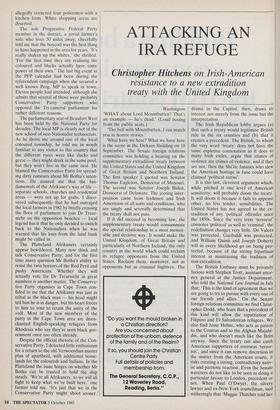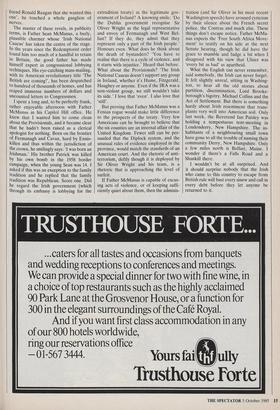ATTACKING AN IRA REFUGE
Christopher Hitchens on Irish-American
resistance to a new extradition treaty with the United Kingdom
Washington `WHAT about Lord Mountbatten? That's an example — he's dead.' (Loud booing from the public seats.) The hell with Mountbatten, I can match you in horror stories.'
What have we here? What we have here is the scene in the Dirksen Building on 18 September. The Senate foreign relations committee was holding a hearing on the supplementary extradition treaty between the United States and the United Kingdom of Great Britain and Northern Ireland. The first speaker I quoted was Senator Thomas Eagleton, Democrat of Missouri. The second was Senator Joseph Biden, Democrat of Delaware. The jeering inter- position came from Irishmen and Irish Americans of all sorts and conditions, who are singly and severally determined that the treaty shall not pass.
If it did succeed in becoming law, the supplementary treaty would consummate the special relationship in a most memor- able and decisive way. It would make the United Kingdom, of Great Britain and particularly of Northern Ireland, the only country in the world which could reclaim its refugee opponents from the United States. Reclaim them, moreover, not as opponents but as criminal fugitives. The drama in the Capitol, then, draws its interest not merely from the issue but the interpretation.
The Irish Republican lobby argues (a) that such a treaty would legitimise British rule in the six counties and (b) that it creates a precedent. The British, to whom the very word 'treaty' does not have the same expletive connotation as it does to many Irish exiles, argue that crimes of violence are crimes of violence, and if they are not, then the Shi'ite fanatics who slew the American hostage in June could have claimed 'political status'.
It is this last, cleverest argument which, while pitched at one level of American sensitivity, will probably doom the treaty. It will doom it because it fails to appease other, no less tender, sensibilities. The United States has not agreed to the ex- tradition of any 'political' offender since the 1850s. Since the very term 'terrorist' connotes 'political' as well as 'criminal', the redefinition changes very little. De Valera was protected, Garibaldi was protected, and William Quinn and Joseph Doherty will in every likelihood go on being pro- tected, because of the strong bipartisan interest in maintaining the tradition of non-extradition.
The British Embassy must be privately furious with Stephen Trott, assistant attor- ney general at the Justice Department, who told the National Law Journal in July that: 'This is the kind of agreement that we are going to try to pursue with every one of our friends and allies.' On the Senate foreign relations committee we find Christ- opher Dodd, who fears that a precedent of this kind will allow the repatriation of Filipino and El Salvadorean refugees. We also find Jesse Helms, who acts as patron to the Contras and to the Afghan Mujahi- din, and who doesn't much like the Brits anyway. Since the treaty can also catch American supporters of overseas 'terror- ists', and since it can remove discretion in the matter from the American courts, it risks creating a strong, contradictory nativ- ist and patriotic reaction. Even the Senate waverers do not like to be seen as doing a particular favour to London, precedent or not. When Paul O'Dwyer, the silvery lawyer and ex-New York councilman, said witheringly that 'Maggie Thatcher told her
friend Ronald Reagan that she wanted this one', he touched a whole ganglion of nerves.
The master of these revels, in publicity terms, is Father Sean McManus, a burly, plausible charmer whose 'Irish National Caucus' has taken the centre of the stage. In the years since the Redemptorist order found him too much of a handful to retain in Britain, the good father has made himself expert in congressional lobbying techniques. His eye-catching mass-mailing, with its American revolutionary title 'The British are coming!', has been despatched to hundred of thousands of homes, and has reaped immense numbers of dollars and uncounted letters to Congressmen.
I spent a long and, to be perfectly frank, rather enjoyable afternoon with Father McManus in his Capitol Hill office. He knew that I wanted him to come clean about the Provisionals, and it became clear that he hadn't been raised as a clerical apologist for nothing. Born on the frontier of Fermanagh and Cavan, hard by Ennis- killen and thus within the jurisdiction of the crown, he smilingly says: 'I was born an Irishman.' His brother Patrick was killed by his own bomb in the 1958 border campaign, when the young Sean was 14. I asked if this was an exception to the family tradition and he replied that the family tradition was Republican. Score one. Did he regard the Irish government (which through its embassy is lobbying for the
extradition treaty) as the legitimate gov- ernment of Ireland? A knowing smile: 'Do the Dublin government recognise Sir Oliver Wright as the legal representative and envoy of Fermanagh and West Bel- fast? If they do, they admit that they represent only a part of the Irish people.' Honours even. What does he think about the death of bystanders? 'You have to realise that there is a cycle of violence, and it starts with injustice.' Heard that before. What about the Provisionals? 'The Irish National Caucus doesn't support any group in Ireland, whether it's Hume, Fitzgerald, Haughey or anyone. Even if the IRA was a non-violent group, we still wouldn't take its side.' I love that 'even'. I also love that 'still'.
But proving that Father McManus was a Fenian rogue would make little difference to the prospects of the treaty. Very few Americans can be brought to believe that the six counties are an internal affair of the United Kingdom. Fewer still can be per- suaded that the Diplock system, and the unusual rules of evidence employed in the province, would match the standards of an American court. And the rhetoric of anti- terrorism, deftly though it is deployed by Sir Oliver Wright and his team, is a rhetoric that is approaching the level of surfeit.
If Father McManus is capable of excus- ing acts of violence, or of keeping suffi- ciently quiet about them, then the adminis- tration (and Sir Oliver in his most recent Washington speech) have aroused cynicism by their silence about the French secret police, the Contras and much else. These things don't escape notice. Father McMa- nus expects the 'Free South Africa Move- ment' to testify on his side at the next Senate hearing, though he did have the grace to mumble and fudge a bit when I disagreed with his view that Ulster was 'every bit as bad' as apartheid.
What the English can never remember, said somebody, the Irish can never forget. It felt slightly unreal, sitting in Washing- ton, to hear all the old stories about partition, discrimination, Lord Brooke- borough's bigotry, Michael Collins and the Act of Settlement. But there is something hardy about Irish resentment that trans- plants very well into American soil. Only last week, the Reverend Ian Paisley was holding a tempestuous tent-meeting in Londonderry, New Hampshire. The in- habitants of a neighbouring small town have gone to all the trouble of naming their community Derry, New Hampshire. Only a few miles north is Belfast, Maine. I wonder if there's a Falls Road and a Shankill there.
I wouldn't be at all surprised. And it should surprise nobody that the Irish who came to this country to escape from British rule will bust every sinew and call in every debt before they let anyone be returned to it.



























































 Previous page
Previous page